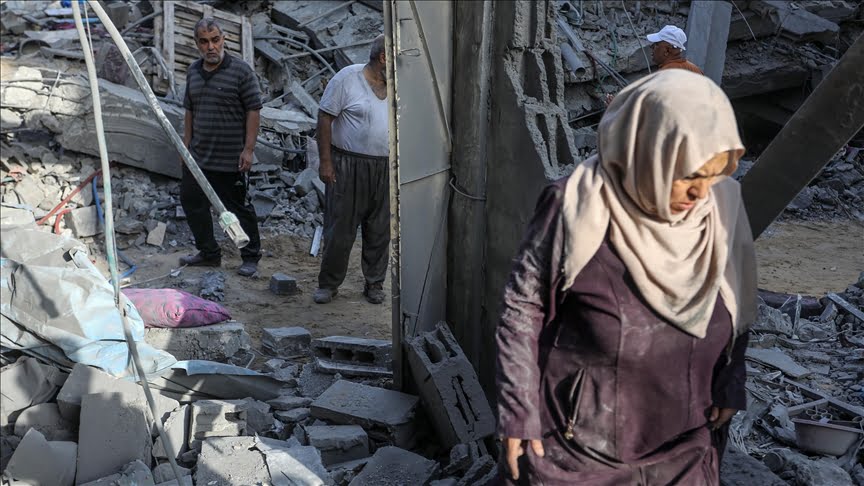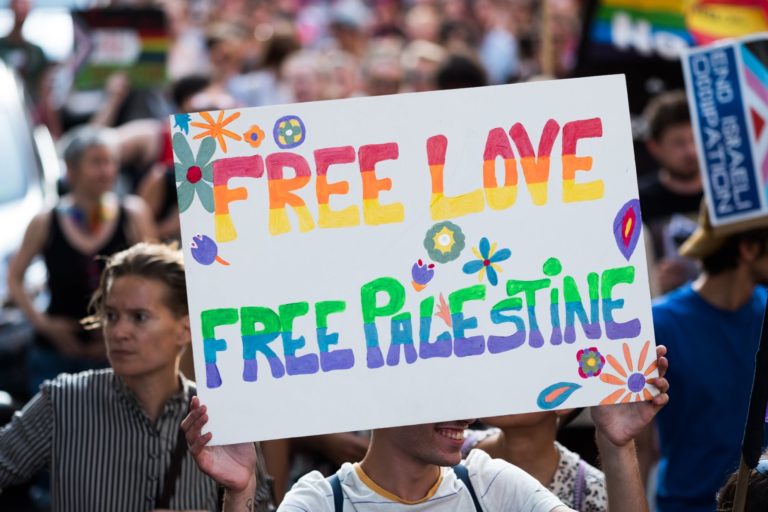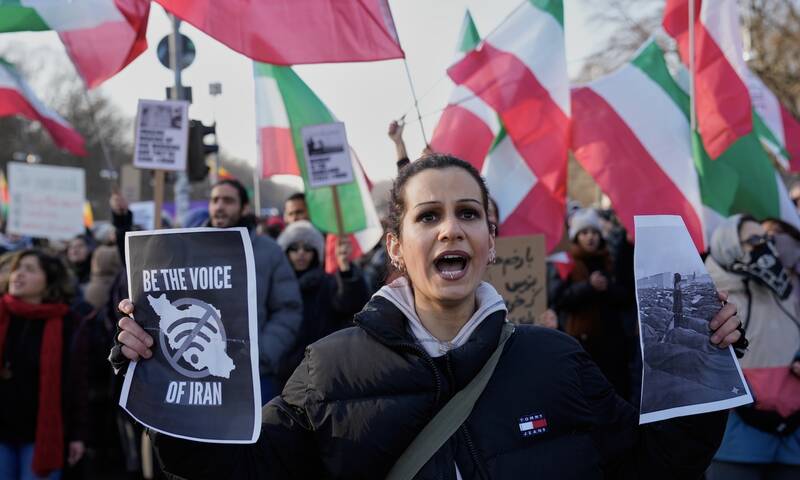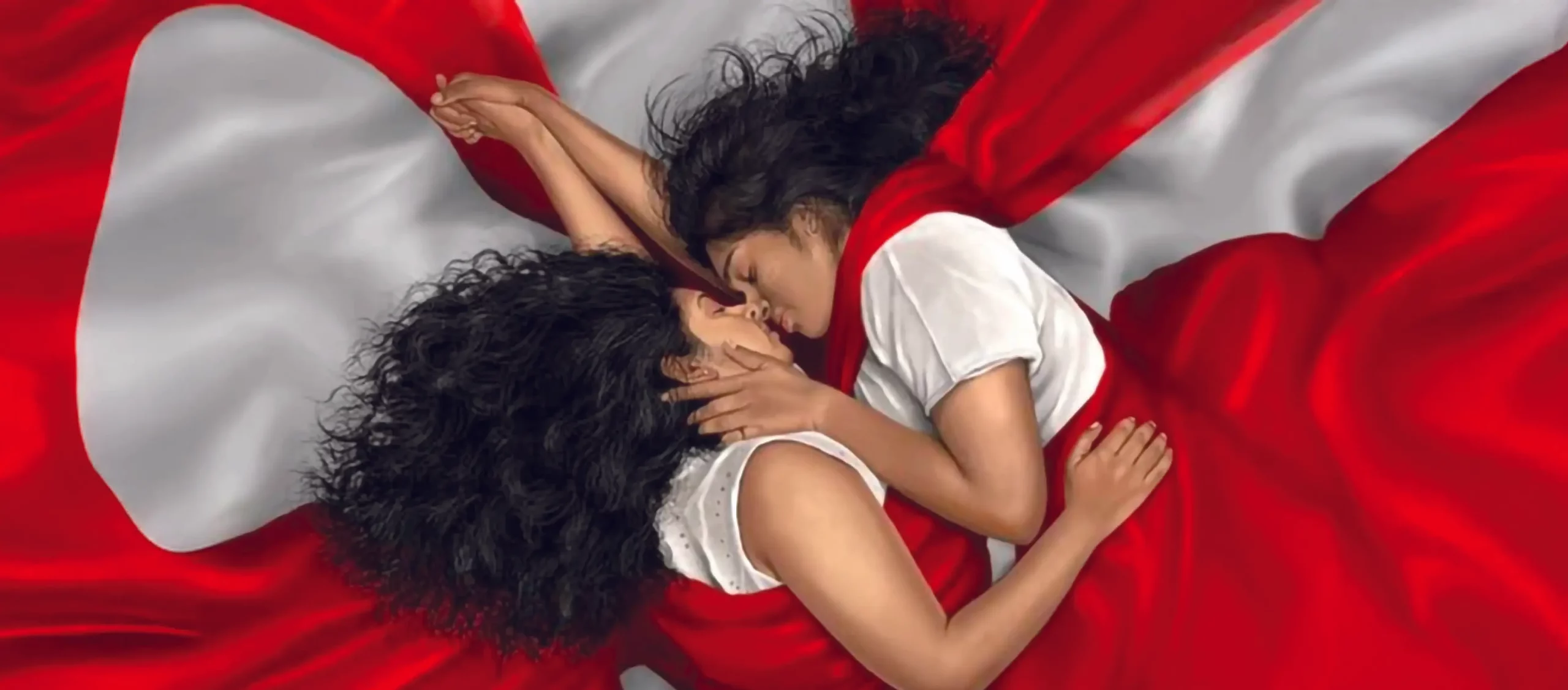As the war between Israel and Hamas enters its fourth week, much of the global public has taken to social media and in-person demonstrations to protest the killing and forced displacement of Palestinian civilians in the long-disputed territories of Gaza and the West Bank. The critique and outrage over Israel’s occupation and apartheid regime has also been met with its fair share of backlash by Israeli citizens, the global Jewish community, and their supporters across the world. The world now bears witness to a crescendo of pro-Israel voices taking a variety of routes and forms, many of which aim to portray Israel as a progressive state. One of these tactics is pink washing.
In queer spaces of discourse, a recurring theme amongst these voices attempts to highlight the nation’s support for its LGBTQIA+ citizens. There is a kind of memeification associated with this narrative to retort against gay people who choose to speak out against Israel by telling them how they will be ‘pushed off rooftops’ if they were to live amongst the Palestinians that they openly support.
This seems to be a widely used tactic in current years, formally known as Homonationalism (or pink washing) and reveals its unique resonance within this long-standing conflict. In fact, the very term ‘pink washing’ was used first in 2010 by Ali Abunimah to describe Israel’s discrimination, as stated in Sara Schulman’s book Israel/Palestine and the Queer International. At its essence, pink washing entails skilful image management, projecting a nation as a haven for LGBTQ+ communities while portraying its adversaries as intrinsically queerphobic.
At its essence, pink washing entails skilful image management, projecting a nation as a haven for LGBTQ+ communities while portraying its adversaries as intrinsically queerphobic.
For decades, this has been a key logic of US nationalism which uses their “acceptance” or “tolerance” for homosexuality as a barometer by which to evaluate the progressiveness of their own country and communities, and alternatively, the “backwardness” of others. In this line of thought, white queer subjects become indispensable to the nation-state; many might be perplexed at the thought of a right wing homosexual but the truth is, this character need not be surprising nor contradictory as it is in fact a deliberate product of a number of imperialist and/or nativist governments.
Now, in the wake of the latest resurgence of the Israeli-Palestinian war, the use of what is at its best a marketing strategy and at its worst an apparently acceptable justification for genocide, reflects extremely poorly on those that fall back upon this logic in response to well-deserved criticism of the Israeli government. In a way, the homo-nationalist argument being circulated by a number of pro-Israel individuals and groups aims to sell the idea that to be a good queer person or ally, one must show support for Israel. It claims that as a state that has enforced legal rights and protections for the queer community, it is the LGBTQ Eden of the Middle East and is therefore worthy of queer support.
Of all the flaws in this rhetoric, perhaps the most laughable one is that it is simply dishonest. While Israel may be a haven for Jewish Israeli queer people or also perhaps for the large number of visitors engaging in the country’s gay tourism, this is far from the reality of queer Palestinians living in the region. Israel has a penchant for declaring to “save” Palestinian queers from their supposed monolith of a culture steeped in supposed “oppression” and “homophobia”. However, Palestinian activists have a different tale to tell. For one, at risk queer Palestinians seeking asylum on account of their sexuality face abusive policies, institutional hostility, police brutality, and a slew of unending obstacles and barriers to obtain legal status and protections. In a 2021 article by 972 Magazine, a young queer Palestinian says, ‘If I would have known what it was really like, I would have rather died in the West Bank than live here like this.‘
But even upon being allowed into Israelis’ self-acclaimed “queer paradise”, the struggle for acceptance remains an uphill battle for queer Palestinians
But even upon being allowed into Israelis’ self-acclaimed “queer paradise”, the struggle for acceptance remains an uphill battle for queer Palestinians. Ghadir Shafie, a Palestinian feminist who has dedicated her life to the cause of queer Palestinian women, recalls in a 2015 testimony titled Pinkwashing: Israel’s International Strategy and Internal Agenda, her experience with Jewish queers when she initially moved to Tel Aviv in search of a more accepting, free way of life. ‘They affirmed that I did not look and sound Arab…I protested that my name clearly showed I was Arab. That was when they proposed changing my name for me.’ It became clear to Shafie then that she was welcome in Tel Aviv as a lesbian, but not so much as a Palestinian lesbian. There was a kind of racialised pressure to choose one identification over the other, and the alleged queer-friendly ideology of Israel did not extend to her as long as she maintained her Arab identity.
Shafie also shares some insightful learnings from discussions with other queer Palestinian women. She explains that while pink washing is a strategy to divert global attention from Israel’s egregious violations of human rights and international law, it is also a tactic used to contain and curb radical Palestinian dissent. She describes the exclusion and alienation of the Palestinian identity from the “gay haven” as ‘merely symptomatic‘ as it is all part of a larger ploy to neutralise the potentially radical politics of queer Palestinians ‘in favour of a bourgeoise and domesticated‘ gay lifestyle. In this way, Israel systemically and socially separates queer Palestinians from their ethnic identity thereby limiting the possibility for radical change and mobilisation in Palestinian communities.
At a systemic level, Shafie recalls how following an attack on an LGBT centre in Tel Aviv, the Ministry of Education made significant efforts to cultivate an inclusive atmosphere for queer students but refused to allow Shafie’s organisation for Palestinian Gay Women to provide training courses on sexual rights and politics. She alleges that her organisation has been sabotaged and deliberately excluded over many years to contribute to any project that aimed to promote tolerance within Palestinian societies. Instead, the government and foreign embassies insisted on funding Israeli organisations to educate Palestinian communities about sexual freedoms that is, as Shafie states, ‘delivered condescendingly by non-Palestinians…ignoring cultural, language and other particularities.‘
At a systemic level, Shafie recalls how following an attack on an LGBT centre in Tel Aviv, the Ministry of Education made significant efforts to cultivate an inclusive atmosphere for queer students but refused to allow Shafie’s organisation for Palestinian Gay Women to provide training courses on sexual rights and politics
This insistence can only be interpreted to be rooted in the belief that Palestinians are not “civilised” enough to comprehend or respect gay rights. For queer Palestinians this becomes an uncomfortable environment in which to “come out” as it restricts their sexual identities to the Israeli Jewish understanding of LGBTQ ‘even if and when the parameters of such a narrow spectrum do not apply to their local contexts‘. It appears as though this kind of system is intentionally invested in keeping Palestinian’s out of the conversation and trapping queer Palestinians in a vicious cycle wherein they are forced to take uncomfortable refuge in Israeli Jewish queer circles because they are not “Palestinian enough” for their own communities.
Over the past few months stories of pink washing have grown even more violent, as reported by Al Jazeera, revealing that the Israeli army regularly blackmails queer Palestinians into becoming informants against their friends and family at the threat of being outed to them. The supposedly gay friendly state therefore acts against the principles it shows to the world by preying on the vulnerability of queer Palestinians.
Pro-Israel stances in queer spaces therefore, will always be in bad taste, but more so now with the most recent update on the situation stating that Israel has cut off all communication between Gaza and the rest of the world amidst the heaviest aerial bombarding of the war thus far. This has become bigger battleground than a simple debate about pink washing and the unequal treatment between queer Palestinians and queer Israeli Jews. At the moment, we seem to be witness to a deeply bizarre crossfire in queer spaces of discourse around this current situation where one side pleads to cease fire and allow Palestinians the right to life, and the other parades Israel’s “queer friendly” policies as a testament to Israel’s moral righteousness.
Ultimately, whether or not Israel is truly a queer-affirmative nation-state, their nationalist rhetoric makes one thing clear: the rights of homosexuals from their own communities outweigh the fundamental right to life, equality, self-determination and dignity for some specified “others”
Ultimately, whether or not Israel is truly a queer-affirmative nation-state, their nationalist rhetoric makes one thing clear: the rights of homosexuals from their own communities outweigh the fundamental right to life, equality, self-determination and dignity for some specified “others”. The use of homo-nationalism in the Israel-Palestine conflict is however, far from a solitary case and has been adopted by a number of other majoritarian, imperialist or, nativist governments across the world to distract from the harsh realities of occupation, violence, and discrimination whilst using the queer community as pawns in a geopolitical chess game through pink washing, leaving us to question the true priorities of these nations and the ulterior motives behind pursuing the semblance of equality on the international stage
Resources:
https://www.aljazeera.com/opinions/2014/8/9/against-the-pinkwashing-of-israel
https://www.972mag.com/lgbtq-palestinians-israel-asylum/
https://kohljournal.press/pinkwashing-israels-international-strategy
https://www.tabletmag.com/sections/israel-middle-east/articles/pink-eye
https://www.theguardian.com/world/2023/oct/27/gaza-internet-cutoff-israel-siege-casualties









Words fail me…